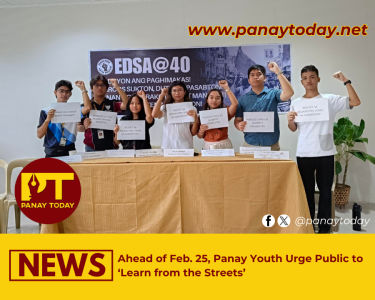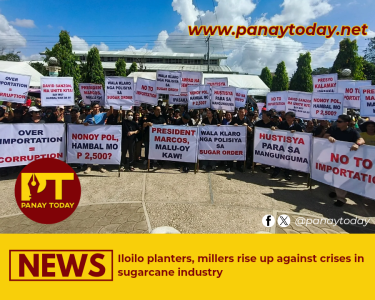ILOILO City – A militant priest from Mindanao believes that President Rodrigo Duterte is more sincere than his predecessors in terms of looking for solutions to achieve peace and unity in the country.
In a peace summit held yesterday, Rev. Christopher Ablon, a peace platform coordinator in Mindanao, said that the current Duterte administration has three factors (for peace process) that are lacking from previous administrations.
The peace summit organized by the Promotion of Church People’s Response (PCPR) gathered together church people and peace advocates from various sectors to discuss the prospects what Duterte administration brings vis a vis people’s agenda for just and lasting peace.
“Recently, we have noticed three factors that are important in the resumption of the talks that were absent on the previous administrations,” Rev. Ablon said in a gathering of church people for peace held at St. Clement’s Jubilee Hall.
Firm principal
Firm principal, Rev. Ablon said, refers to President Duterte.
“You never heard former president Benigno Aquino talking about peace talks, or he is pushing for peace talks. Even former president Gloria Macapagal-Arroyo,” Rev. Ablon said.
“But with the current administration of President Duterte, it has been his banner program that his team should talk with the Reds or the Left, and of course also with his Moro brothers and sisters,” he added.
“President Duterte’s message is clear and strong that he wants to pursue peace and that is very important for us.”
The revered priest added “though there is the existence of the Government of the Philippines (GPH) panel and the Office of the Presidential Adviser on Peace Process (OPAPP), the truth is that when the president says no (on peace talks), it is absolutely no because he has the last say.”
“So if the president will stay as it is as what we heard with President Duterte, it’s good. And I think that’s one of the reasons why the National Democratic Front of the Philippines (NDFP) is positive in their response because the message of Duterte is very strong,” he said.
History of talks
Peace talks have been on and off since Cory Aquino’s administration.
Formal talks began in November 1986 but was ended because of the Mendiola Massacre in January 1987 that killed 14 farmers.
Arrests of NDF panelists broke the confidence of the NDF to hold future talks with the Cory administration.
During the administration of Fidel Ramos, the National Unification Commission and the OPAPP was created.
Formal talks resumed in 1992 and on September 1992 both parties signed the foundation of the peace process, The Hague Joint Declaration.
In February 1995, the Joint Agreement on Safety and Immunity Guarantees (JASIG) was signed to ensure safety of members of both negotiating panels.
It was on March 1998 when the first sustentative agenda, the Comprehensive Agreement on Respect for Human Rights and International Humanitarian Law (CARHRIHL), was signed. The second agenda on social and economic reforms never materialized after CARHRIHL. And so are the third, political and constitutional reforms and fourth, end of hostilities and disposition of forces.
Fr. Ablon stressed that the four agenda should be implemented in order. But previous administrations have been calling for end of war without tackling the assurance of the second and third agenda.
Trust of both parties
The trust between Duterte and the left has been forged long ago.
Duterte even called himself the first Left president and that he is a socialist.
“Unlike in previous administrations, you can hear both panels throwing issues against each other. The GPH for instance will accuse the NDF of using the peace process to release political prisoners while the NDF will question the seriousness of the GPH, but with the Duterte, it is different,” said Fr. Ablon.
Duterte as Davao City mayor has previously facilitated countless releases of elements of the military as prisoners of war (POW) of the New People’s Army (NPA) and has also received several political prisoners as custodian of those released on recognizance.
“Moreover, the Left recognized and appreciated Duterte’s anti-US stand. He showed anti-US stance for several times like the Meiring case where he publicly lambasted the US for defending and safe keeping their US army element and CIA agent Michael Meiring after the accidental explosion of the bomb he was making at a Davao Hotel,” said Fr. Ablon.
“He also did not allow Davao airport to be used as a launching facility for drones in Mindanao. He has direct line to the CPP-NPA-NDFP. His connection to Jose Maria Sison is on a personal level,” said Fr. Ablon.
Unwavering panel
Department of Labor Secretary Silvestre Bello III and Atty. Rene Sarmiento formerly served as members of the GPH peace panel during the Ramos administration.
During their term they were able to forge countless agreements including CARHRIHL.
CARHRIHL can be ascribed during the Ramos administration because of the paper works, although it was only with the then Estrada administration that both parties signed the agreement.
“With their track record, we can say that they (Bello and Sarmiento) were veteran negotiators and we have seen them come up with results,” Fr. Ablon said.
“Then there comes Hernani Braganza who is personally related to NDF Spokesperson Fidel Agcaoili,” Fr. Ablon added.
According to Fr. Ablon the most important ingredient for a successful peace talk is the confidence of the panels themselves that the peace talks under the Duterte administration will head to a good direction.
“The previous panel headed by Alexander Padilla have been talking that the peace negotiation will achieve nothing. They (GPH panel) said they have conducted a meeting but with no result and then there’s no resumption of talks because it will led to nothing. Therefore the panel is negative. If that is so, then that will be difficult,” said Fr. Ablon.
“But this present panel have worked under the Ramos administration where they never dropped negotiations and if they’ll stay on that path and maintain their manner of dealing like on cases of misunderstandings and only take a break but not suspend the talks, then will meet again, I think there’ll be more avenues for understanding and maybe they can come up fast on agreements,” Fr. Ablon said.
Spoilers
“But there will always be spoilers. Those that do not want unity and peace,” said Fr. Ablon.
Fr. Ablon is the Mindanao coordinator of the Philippine Ecumenical Peace Platform (PEEP) and serves as the secretary general of human rights group Karapatan – Northern Mindanao Region./PT




